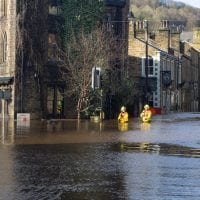The solutions to climate change are clear, and fairly simple. Some are things we can do as individuals, like changing our diets and how often we travel. But most solutions rely on the government creating new laws and making sure they are applied fairly across our society.
Without government planning, it will be more difficult to end our society’s reliance on fossil fuels and switch over to renewable energy, for example. It will be hard to reduce private car use without better public transport. And the government can really help with restoring nature to better absorb carbon dioxide from the atmosphere.
For these solutions to work, governments and companies need to encourage and invest in them. So how is the UK doing in terms of tackling climate change so far? What has the government committed to do, and what’s actually been done?
What has the UK committed to do about climate change?
Politicians in the UK have known about climate change and its likely consequences for many years – even going back to Margaret Thatcher in the 1980s.
The UK signed the world’s largest legally-binding international treaty, the 2015 Paris agreement on climate change, which has the goal of limiting global warming to well below 2ºC and ideally to 1.5ºC.
Climate Change Act 2008
The UK was the first country in the world to create a legally-binding national commitment to cut greenhouse gas emissions. The Climate Change Act of 2008 pledged to cut our emissions as a country by 80% by 2050, from 1990 levels.
The 80% target was updated in 2019 with the target of achieving an effective 100% reduction by 2050. This is known as the “net zero” target. This is where any remaining emissions of greenhouse gases in 2050 are balanced by removing and absorbing the same amount of carbon from the atmosphere.
The Climate Change Act 2008 also created a Climate Change Committee, which puts forward carbon budgets to the government. Carbon budgets are five years long and are set a decade ahead, to allow the government time to prepare, plan, make laws and get the right kind of investments in place. The first (2008–12), second (2013–17) and third (2018–22) carbon budgets have been met, and the fourth (2023–27) has been set.
Is the UK really all that responsible for global climate change?
It’s tempting to think that the UK, being a small collection of islands, isn’t a big contributor to global greenhouse gas emissions. Some people believe that countries like China or India have more of a responsibility to curb their national emissions, as they are much larger countries with much larger populations. But this is a little simplistic.
The UK is actually one of the world’s greatest contributors to global warming over time. Our long history of burning fossil fuels at scale began during the Industrial Revolution in the eighteenth and nineteenth centuries. This led to high carbon emissions both in the US and the UK.
An Oxfam study found that the richest one percent of the world’s population were responsible for more than twice as much carbon pollution as the world’s poorest 3.1 billion people, from 1990 to 2015.
The truth is that European and North American countries currently consume more, and have higher emissions per person on average, than those in China or India.
However, this does mean that we can do more than most countries with equivalent emissions to tackle climate change – and use our wealth and diplomatic power to lead by example.
What’s the UK’s role in tackling climate change internationally?
The UK is one of the wealthiest countries in the world, with immense industrial and technological knowledge, and business and political influence across the globe. What happens here in the UK – and in our relationships with other countries – can inspire stronger action worldwide.
In 2021, the UK hosted the flagship international climate conference, COP26, in Glasgow.
The UK is well-placed to be a leader in international negotiations on climate change. But, like many wealthy nations, the UK’s economy has long been heavily dependent on burning fossil fuels – both at home and abroad
The UK government has committed to reduce state funding of fossil fuel projects abroad, which is definitely progress. But private financing of fossil fuels from the UK’s finance industry continues to worsen climate change across the world. By funding polluting projects all over the world, the UK’s finance industry creates 1.8 times more emissions than the whole of the UK. This needs to be addressed urgently.
In international climate change negotiations, the UK must show leadership. Commitments made to climate finance for poorer countries are yet to be delivered. And given the UK’s role in causing climate change, it needs to commit more money to help countries suffering loss and damage from climate change.
How are the UK’s climate commitments going at home?
In terms of reducing greenhouse gas emissions at home, the UK isn’t doing too badly.
By 2020, the UK was barely using any coal at all – down to zero for a couple of months, from getting 40% of our electricity from coal a decade earlier.
The UK’s targets of phasing out coal by 2024 compares well to others in Europe, such as Germany, which has a target of 2038. And the UK is generally doing well on renewables, with each year more and more of our electricity being created by wind power.
This is a great start. But the move away from coal and gas and towards renewable energy needs to be scaled up dramatically, and fast.
Other areas also show room for improvement. Support must be provided to insulate homes to reduce emissions. Renewable energy sources need to built faster. And the UK government is not doing enough to enable a shift to green and active transport.
Climate change is a global emergency. The UK and many other countries have had years to work towards solutions. That’s why Greenpeace, along with many other environmental organisations and protest groups, continue to push for strong government and corporate action to tackle climate change.




